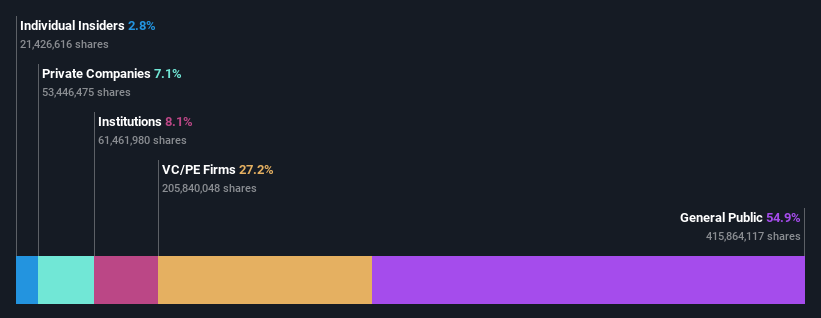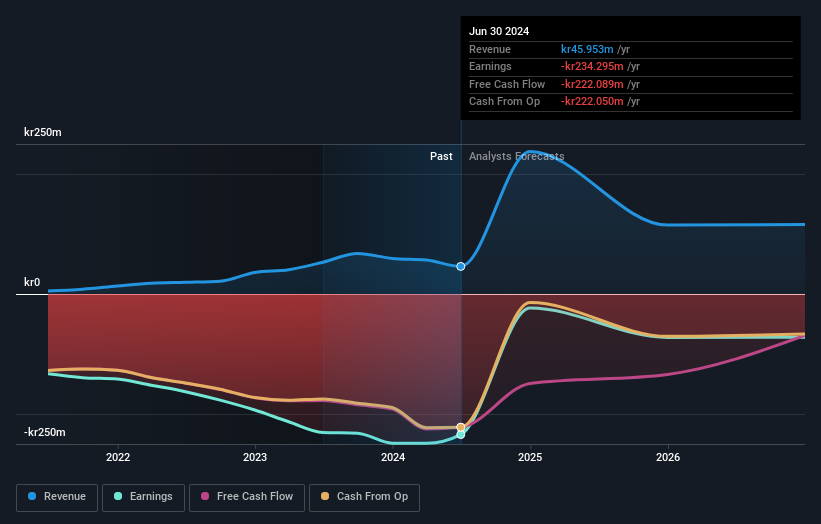Alligator Bioscience AB (publ)'s (STO:ATORX) biggest owners are individual investors who got richer after stock soared 11% last week

Key Insights
- Significant control over Alligator Bioscience by individual investors implies that the general public has more power to influence management and governance-related decisions
- A total of 24 investors have a majority stake in the company with 46% ownership
- Using data from company's past performance alongside ownership research, one can better assess the future performance of a company
A look at the shareholders of Alligator Bioscience AB (publ) (STO:ATORX) can tell us which group is most powerful. The group holding the most number of shares in the company, around 55% to be precise, is individual investors. Put another way, the group faces the maximum upside potential (or downside risk).
As a result, individual investors were the biggest beneficiaries of last week’s 11% gain.
Let's delve deeper into each type of owner of Alligator Bioscience, beginning with the chart below.
See our latest analysis for Alligator Bioscience

What Does The Institutional Ownership Tell Us About Alligator Bioscience?
Institutional investors commonly compare their own returns to the returns of a commonly followed index. So they generally do consider buying larger companies that are included in the relevant benchmark index.
As you can see, institutional investors have a fair amount of stake in Alligator Bioscience. This suggests some credibility amongst professional investors. But we can't rely on that fact alone since institutions make bad investments sometimes, just like everyone does. When multiple institutions own a stock, there's always a risk that they are in a 'crowded trade'. When such a trade goes wrong, multiple parties may compete to sell stock fast. This risk is higher in a company without a history of growth. You can see Alligator Bioscience's historic earnings and revenue below, but keep in mind there's always more to the story.

Alligator Bioscience is not owned by hedge funds. Allegro Investment Inc. is currently the largest shareholder, with 27% of shares outstanding. In comparison, the second and third largest shareholders hold about 7.1% and 5.0% of the stock.
A deeper look at our ownership data shows that the top 24 shareholders collectively hold less than half of the register, suggesting a large group of small holders where no single shareholder has a majority.
Researching institutional ownership is a good way to gauge and filter a stock's expected performance. The same can be achieved by studying analyst sentiments. There is a little analyst coverage of the stock, but not much. So there is room for it to gain more coverage.
Insider Ownership Of Alligator Bioscience
While the precise definition of an insider can be subjective, almost everyone considers board members to be insiders. Company management run the business, but the CEO will answer to the board, even if he or she is a member of it.
I generally consider insider ownership to be a good thing. However, on some occasions it makes it more difficult for other shareholders to hold the board accountable for decisions.
Shareholders would probably be interested to learn that insiders own shares in Alligator Bioscience AB (publ). In their own names, insiders own kr29m worth of stock in the kr1.0b company. This shows at least some alignment, but we usually like to see larger insider holdings. You can click here to see if those insiders have been buying or selling.
General Public Ownership
The general public, mostly comprising of individual investors, collectively holds 55% of Alligator Bioscience shares. With this amount of ownership, retail investors can collectively play a role in decisions that affect shareholder returns, such as dividend policies and the appointment of directors. They can also exercise the power to vote on acquisitions or mergers that may not improve profitability.
Private Equity Ownership
With an ownership of 27%, private equity firms are in a position to play a role in shaping corporate strategy with a focus on value creation. Sometimes we see private equity stick around for the long term, but generally speaking they have a shorter investment horizon and -- as the name suggests -- don't invest in public companies much. After some time they may look to sell and redeploy capital elsewhere.
Private Company Ownership
It seems that Private Companies own 7.1%, of the Alligator Bioscience stock. It might be worth looking deeper into this. If related parties, such as insiders, have an interest in one of these private companies, that should be disclosed in the annual report. Private companies may also have a strategic interest in the company.
Next Steps:
While it is well worth considering the different groups that own a company, there are other factors that are even more important. For instance, we've identified 5 warning signs for Alligator Bioscience (2 are a bit concerning) that you should be aware of.
But ultimately it is the future, not the past, that will determine how well the owners of this business will do. Therefore we think it advisable to take a look at this free report showing whether analysts are predicting a brighter future.
NB: Figures in this article are calculated using data from the last twelve months, which refer to the 12-month period ending on the last date of the month the financial statement is dated. This may not be consistent with full year annual report figures.
New: Manage All Your Stock Portfolios in One Place
We've created the ultimate portfolio companion for stock investors, and it's free.
• Connect an unlimited number of Portfolios and see your total in one currency
• Be alerted to new Warning Signs or Risks via email or mobile
• Track the Fair Value of your stocks
Have feedback on this article? Concerned about the content? Get in touch with us directly. Alternatively, email editorial-team (at) simplywallst.com.
This article by Simply Wall St is general in nature. We provide commentary based on historical data and analyst forecasts only using an unbiased methodology and our articles are not intended to be financial advice. It does not constitute a recommendation to buy or sell any stock, and does not take account of your objectives, or your financial situation. We aim to bring you long-term focused analysis driven by fundamental data. Note that our analysis may not factor in the latest price-sensitive company announcements or qualitative material. Simply Wall St has no position in any stocks mentioned.
About OM:ATORX
Alligator Bioscience
A research-based biotechnology company, develops antibody-based pharmaceuticals for cancer treatment in Finland and Sweden.
Medium-low and slightly overvalued.
Market Insights
Community Narratives



